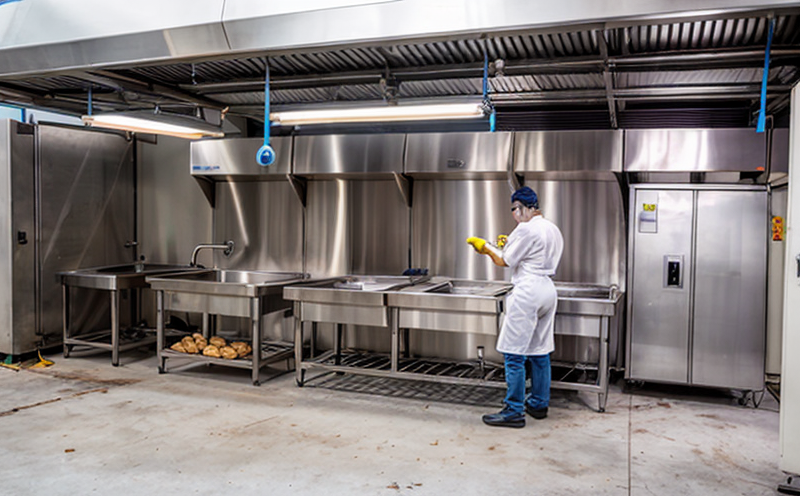Food handling equipment inspection
In the realm of food safety and hygiene, ensuring that all equipment used in food preparation meets stringent standards is paramount. This is especially critical given the high stakes involved—any breach can have severe consequences ranging from health hazards to regulatory penalties. The purpose of this service is to provide comprehensive inspections aimed at verifying the integrity, functionality, and compliance with relevant international standards (such as ISO 22000) of food handling equipment used in various settings including commercial kitchens, catering establishments, and food processing plants.
The inspection process involves several key steps. Initially, a thorough visual examination is conducted to identify any visible signs of wear or damage that could affect the functionality and safety of the equipment. This includes checking for cracks, dents, and any other physical imperfections on surfaces such as blades, cutting boards, and grinders.
Following this initial assessment, specific tests are carried out based on the type of equipment being inspected. For instance, if it's a meat grinder, we would conduct performance tests to ensure that it can grind meats efficiently without introducing contaminants into the product stream. Similarly, for ovens or other thermal processing units, we check their temperature control systems and insulation to prevent cross-contamination due to improper heat distribution.
Microbiological testing is another crucial aspect of our inspection process. Samples are taken from different parts of the equipment where pathogens like Salmonella, E. coli, Listeria, etc., might reside after contact with food items. These samples are then analyzed in a laboratory setting according to established protocols (ISO 13296) to determine whether there is any contamination that could pose risks to consumers.
The final phase of the inspection focuses on documenting findings and issuing reports detailing what was found during each stage of testing. Our reports not only summarize our observations but also provide recommendations for corrective actions needed if deficiencies were identified during inspections. This helps facilities take proactive measures to maintain high standards of hygiene and safety within their operations.
By adhering strictly to these rigorous procedures, we ensure that every piece of equipment passing through our inspection process is safe for use in food preparation environments. Our goal is to contribute significantly towards safeguarding public health while also assisting businesses in meeting regulatory requirements effectively.
Why Choose This Test
- Comprehensive assessment covering all critical aspects of food handling equipment.
- Strict adherence to international standards ensuring reliability and accuracy.
- Expertise backed by years of experience in the field of food safety.
- Use of state-of-the-art laboratory facilities for thorough analysis.
- Prompt delivery of detailed reports with actionable insights.
- Cost-effective solution tailored specifically to meet your business needs.
The importance of choosing this test cannot be overstated. Regular inspections help maintain the highest levels of hygiene and safety, which are essential components in any food production facility. By investing in our services, you're not only complying with regulations but also demonstrating a commitment to protecting public health—a value that resonates strongly among consumers today.
Quality and Reliability Assurance
The quality of the equipment used in food handling is directly linked to the safety and hygiene of the end product. Therefore, ensuring these machines meet strict standards before they enter service is crucial. Our laboratory specializes in providing robust quality assurance through our inspection services which go beyond basic checks; instead, we delve deeper into understanding how each piece of equipment impacts overall food quality.
Our approach involves several layers of scrutiny aimed at identifying potential weaknesses early on so that necessary adjustments can be made promptly. For example, when inspecting a slicing machine used in a commercial kitchen, we examine not just the blade but also its alignment with surrounding components to ensure even cuts are achieved without introducing foreign particles into the food.
Microbiological testing plays an integral role here too. By sampling various parts of the equipment and analyzing them under controlled conditions (following ISO 13296), we can accurately gauge whether there's any contamination present that could compromise the integrity of the final product. The results from these tests form part of our detailed reports, giving facilities clear guidance on how to address any issues identified.
Through rigorous testing and meticulous documentation, we provide peace of mind knowing that your food handling equipment is up-to-standard. This commitment translates into increased confidence among staff members who operate the machines daily as well as greater trust from customers who consume the prepared foods.
Use Cases and Application Examples
- Commercial Kitchens: Ensuring that all equipment used in cooking processes complies with hygiene regulations helps prevent foodborne illnesses among diners. Our inspections help maintain consistent quality across different establishments.
- Catering Services: For events where multiple courses are served, having reliable inspection reports ensures that caterers can provide safe meals to large groups of people without worrying about contamination risks.
- Food Processing Plants: In industries dealing with raw materials like fruits or meats, proper cleaning and disinfection practices must be enforced rigorously. Our services aid in maintaining these standards throughout the entire production cycle.
- Restaurants Chains: Large restaurant chains often have strict internal guidelines regarding equipment maintenance. Regular inspections by our team allow them to monitor compliance with these policies consistently across all branches.
In each case, our inspection service offers valuable insights into how best practices can be implemented effectively within specific contexts. Whether it's a small café or a multi-national food corporation, we offer tailored solutions designed specifically for their unique requirements.





